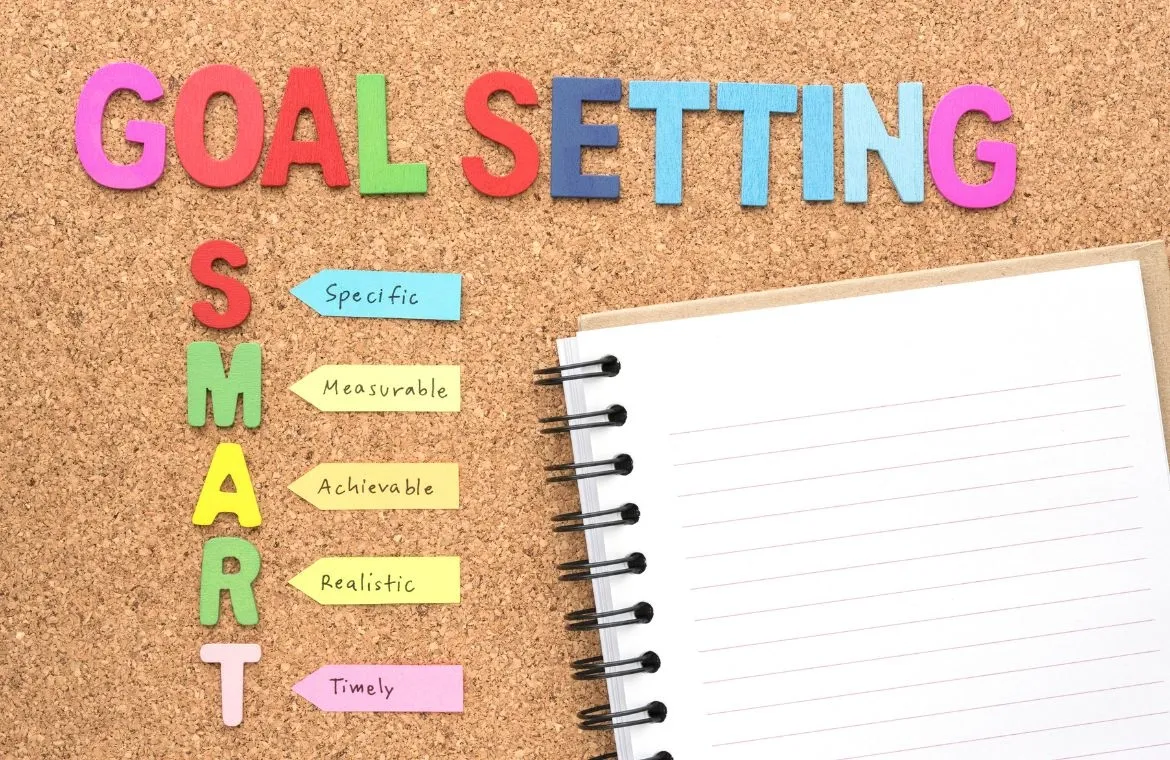Effective Goal Setting Strategies for Freshers

“You can’t hit a target you cannot see, and you cannot see a target you do not have.”
Setting clear, actionable goals isn’t just about writing “get a good job” or “learn new skills” on a to-do list. It’s about giving direction to your ambitions, breaking them into achievable steps, and tracking your progress like a roadmap to success.
This blog explains why fresh graduates need smart goals and how to set career objectives that match your situation. You'll discover proven strategies to turn your aspirations into achievable milestones. Proper goal setting forms the foundation of lasting success, whether you're choosing specialisations or developing core skills.
Why Freshers Need Smart Goals?
New professionals face unique challenges that seasoned experts have already mastered. The job market is competitive, career paths are varied, and learning takes time. SMART goal setting strategies can become your best tool to succeed.
SMART goals are, Specific, Measurable, Achievable, Relevant, and Time-bound objectives, give you a clear framework that turns dreams into action plans. Clear objectives with specific parameters help you focus your efforts and track your progress accurately.
Why SMART goals matter:
They sharpen focus and direction: Today's varied job market needs specific goals to channel your energy toward relevant skills, which increases your success rate.
They build motivation and confidence: Small wins create success patterns that build momentum and drive you forward.
They make time management better: Deadlines in SMART goals lead to better planning and less procrastination.
They create accountability: Measurable targets make it easy to own your achievements.
The power of SMART goals has a neurological basis. Your brain releases dopamine, the "feel-good" neurotransmitter, as you set goals and make progress. This creates a positive cycle that keeps you driven and focused.
What is Goal Setting?
Goal setting is the life-blood of career development. It acts as a compass that guides your professional experience. Goals represent a thoughtful commitment of thought, emotion, and behaviour to achieve specific outcomes, they're not just vague desires or momentary intentions.
Goal setting helps you identify specific, measurable objectives and create applicable plans to achieve them within a defined timeframe. Your desired future state is different from your current situation. This creates a motivational mismatch that drives future actions.
Why is Goal Setting important for early career success?
Fresh graduates benefit from a professional roadmap that schedules achievements, certifications, and desired positions. This roadmap reduces career anxiety by simplifying important decisions once you know what you want.
Goal setting works as a powerful psychological technique that affects all areas of life. Professional focus stays on task performance, career advancement, and organisational success. Personal development builds significant traits like time management, resilience, and adaptability.
People without established goals often feel adrift professionally. They work hard but don't progress meaningfully. Goal setting turns vague aspirations into concrete achievements by providing motivation, direction, and purpose.
How to Set Career Goals as a Fresher?
A clear career path at the start of your professional experience can change your future dramatically. You'll need to reflect, research, and plan strategically to match what industries want.
Self-assessment: Identify interests, strengths, and values
The first step in setting goals is to look within yourself. A full self-assessment will help you understand what drives you both professionally and personally. This foundation will help you set career goals that match who you really are.
Your self,assessment should look at these key elements:
Strengths: Tasks or skills where you naturally shine
Weaknesses: Areas you can improve
Values: What you care about most at work (work-life balance, breakthroughs, security)
Interests: Activities that keep you motivated and energised
Personality: Your work style and how you work with others
Research: Explore career paths and required skills
After understanding yourself better, look for career paths that match your self-assessment results. Good career research includes:
Start by reading job descriptions for roles you like and note the common skills they mention. Then set up conversations with professionals in your target fields to learn firsthand about working conditions and requirements.
Skill mapping: Find the gap between current skills and industry demands
Compare your current abilities to the required skills through a gap analysis. This process shows the difference between what you can do now and what you need to achieve your career goals.
This tool reveals where you need to develop to work effectively. Finding these gaps helps you create focused training plans and decide which skills to build first.
Priority setting: Focus on 1–2 key goals at a time
Success comes easier if you focus on one or two priority goals instead of trying everything at once. This approach keeps you from feeling overwhelmed.
Your priorities should include: critical skills for your target role, what interests you most, and what matters most professionally. Then set "SMART" goals with clear timeframes, short term goals (within one year) and long term goals (one to five years).
Proven Goal Setting Strategies That Work
You've pinpointed your career goals. Let's look at some powerful ways to make them happen. These tested goal setting techniques will help you create a well laid out path to success.
Small Steps That Keep You Moving
If you ever feel like your to do list is never ending, this method is a lifesaver.
The 1,3,5 rule helps you prioritise your daily tasks, so you’re productive without burning out.
Here’s how it works:
1 big goal: The most important thing you must finish today.
3 medium goals: Tasks that support your main goal.
5 small steps: Quick wins or small actions that push you forward.
Example:
If your big goal is “prepare for a job interview”, your medium goals could be researching the company, updating your resume, and practicing answers. Your small steps could include watching a 10,minute interview video or refining your LinkedIn profile.
Backward Planning: Start from your dream job
Imagine you’re planning a road trip. You wouldn’t just get in the car and start driving, you’d first decide where you’re going, right?
That’s exactly how backward planning works.
Start by imagining your dream job, then trace your way backward to where you are today.
Ask yourself:
What skills does that job require?
What qualifications or projects will help me get there?
What’s one thing I can start doing this month to move closer?
This approach gives you a clear roadmap. Instead of guessing your next step, you’ll know what’s needed to reach your destination.
Using AI Tools to Track and Achieve Goals
AI tools give you powerful ways to lift your goal setting strategies beyond manual methods. These AI-powered solutions add personalization, feedback, and visualisation features that traditional approaches don't have.
Notion AI for planning and tracking
Notion AI turns your goals from abstract ideas into practical plans through customizable templates. Its Goal Tracker template creates tailored action plans with attainable timelines that help you stay accountable across different projects. Notion focuses on broader, meaningful milestones that become stepping stones to your biggest dreams, unlike standard task managers.
ChatGPT for brainstorming and feedback
ChatGPT works like your personal career coach and gives useful advice through strategic prompts. Try these specific prompts to make your goal setting better:
"Could you help me draught SMART goals for my next career move?”, To create specific, measurable objectives
"How do I prioritise my goals when everything seems important?”, To develop strategies based on effect and alignment with values
"I want to switch industries. Can you help me identify transferable skills?”, To highlight skills that help with smoother transitions
These prompts create responses that match your unique situation and give you a good starting point to explore options and build your professional path.
Overcoming Common Challenges
Professional life brings obstacles, even with solid strategies and clear goals. You must prepare for these challenges as part of successful goal setting strategies.
Procrastination and burnout: Staying consistent
Mental and emotional exhaustion leads to burnout. Break your goals into smaller tasks and celebrate each win to avoid this. Taking breaks helps you maintain energy and enthusiasm, it's not a sign of weakness.
Fear of failure: Reframing failure as feedback
Top professionals see setbacks as learning opportunities rather than personal flaws. In fact, every successful person has faced failure; their response to it makes the difference. Ask yourself what you learned from the experience instead of focusing on disappointment.
External distractions: Digital minimalism tips
Digital minimalism helps protect your focus through mindful use of technology. Your nervous system stays on high alert with constant notifications. These approaches can help:
Check emails and messages at set times
Keep phones away, particularly before bed
Block time for focused work sessions
Real-life insight: Learning from early mistakes
New professionals often wait for feedback instead of asking for it. A professional shared, "Real growth started when I asked for feedback proactively". This approach shows initiative and speeds up your development.
Also Read: Time Management Tips for Freshers
Conclusion
Your goals are the bridge between where you are and where you want to be, and every small step across that bridge counts, and remember, progress doesn’t always happen in giant leaps, it often comes from small, steady steps taken with purpose.
Each goal you set, big or small, is like a steppingstone leading you closer to your dream career.
So, starting your career is like standing at the beginning of a long, exciting road, full of turns, surprises, and endless possibilities. At first, the path might seem a little unclear, but that’s where effective goal setting becomes your guiding light.
Frequently Asked Questions
Q1. What are the key components of SMART goals for freshers?
SMART goals are Specific, Measurable, Achievable, Relevant, and Time-bound. For freshers, this means setting clear objectives, defining success metrics, ensuring goals are realistic, aligning them with career aspirations, and establishing deadlines for achievement.
Q2. How can I prioritise my career goals effectively?
Focus on one or two key goals at a time to prevent overwhelm. Consider which skills are most critical for your target role, what interests you most, and what's most important to you professionally. Then, set short-term goals (achievable within one year) and long-term goals (one to five years).
Q3. What strategies can help me stay consistent with my goals?
To maintain consistency, try the 1,3,5 Rule (focus on one major task, three medium tasks, and five minor tasks daily), use habit stacking (link new habits to existing ones), and schedule non-negotiable time windows for goal-related work. Regular self-assessment and progress tracking are also crucial.
Q4. How can AI tools assist in goal setting and tracking?
AI tools like Notion AI can help create customised action plans and milestone checklists. ChatGPT can provide personalised advice for drafting SMART goals or identifying transferable skills. Trello offers visual progress tracking through boards, cards, and lists, making it easier to manage deadlines and priorities.
Q5. How should I handle setbacks in my goal pursuit?
Reframe setbacks as learning opportunities rather than failures. Ask yourself what each experience has taught you. Break larger goals into smaller, manageable tasks to prevent feeling overwhelmed. Remember that taking breaks is necessary for maintaining energy and enthusiasm, not a sign of weakness.

TalentSprint
TalentSprint is a leading deep-tech education company. It partners with esteemed academic institutions and global corporations to offer advanced learning programs in deep-tech, management, and emerging technologies. Known for its high-impact programs co-created with think tanks and experts, TalentSprint blends academic expertise with practical industry experience.



